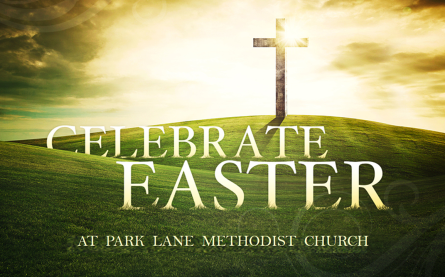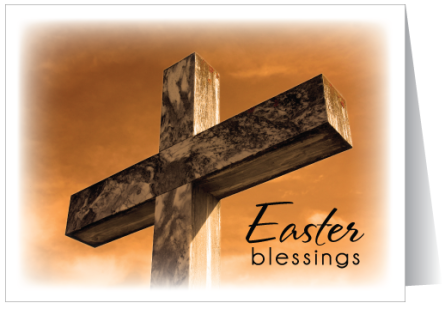Easter Season 2023
Circuit Maundy Thursday Service 8.00pm
Thursday 6th April 2023 at Park Lane Methodist Church
Good Friday Service 9.15am
Friday 7th April 2023 at Park Lane Methodist Church
Walk of Witness at 10.30am
Friday 7th April 2023 from St Erconwald's Roman Catholic Church,
112 Carlton Avenue East
Easter Day Service 10.30am
Sunday 9th April 2023 at Park Lane Methodist Church
Lent
Lent begins with ashes, because ashes can put things into perspective. On Ash Wednesday, we acknowledge our mortality, that all things will pass. (Genesis 3:19).
Lent is a time to reflect on matters that we might not reflect on at other times of the year. It is a time for putting things back into perspective, for taking a good look at ourselves, at what we have become, and at what we are doing with our lives. Ashes provide us with a perspective about what counts and what doesn't. Ashes also inform us that our time is limited and that we should take advantage of the time we have left to continue our spiritual development.
We welcome Lent, therefore, with ashes for the opportunities it will afford us to clear our vision and reset our sights. We have much to do before we turn to dust. Lent is a time for tough questions. Where are you going in life? What are you doing with yourself? What kind of priorities do you live by? What changes should you need to make to ensure a more worthwhile life for yourself? What should you become more serious about? Less serious about? Are you preoccupied and overly concerned with trivia? Do you get angry over petty things? Do you lose sleep over matters that have little lasting import? Do you need to push yourself more on worthwhile projects? Do you need to slow down? Think in terms of ashes and see if it doesn't change your perspective.
Through this commitment we have access to spiritual growth and healing. Lent is a time to be penitent and to seek God's will for our life as surely as Jesus sought God's direction in the wilderness. We live our lives under the shadow of the cross and this is a good time to consider what the implications of that are. It is a time to say teach me afresh, where am I going wrong, how do you want me to change.
In the Old Testament ashes were a sign of sorrow at having let God down they were a demonstration of looking for the new direction and being sorry for what was in the past. They were a sign of repentance and looking forward. The Christian response is of course to see the new direction for us all in the cross and we make the ashes into the sign of the cross. That is where we come to find God's forgiveness and direction for our lives.
Find below our seasonal reflections for the liturgical season of Lent 2023 through to Holy Thursday
A Message from the Minister’s Heart
It is interesting how many people love the spring because of the changes in daylight hours, the renewal of plant life and all the signs of growth and achievable potential in our sights.
The change from winter to spring has a positive impact on many people: despite the fact that they may be seeing the sun while a chilly wind is blowing.
When we look babies that are a few months old it is clear that their features and size have already changed significantly since birth. We are all changing and getting older but some of us don’t like to admit that our bodies are changing and that the image looking back at us from the mirror is a true reflection of reality. There is something about change which sits uncomfortably with many of us, especially when the changes are happening to us or in us. This may be because some of us perceive changes affecting our lives as threatening, despite the reality that some changes usher in growth and development.
Lent has traditionally been a time to consider embracing change. Many Christians consider what they want to give up and sometimes fall into the trap of giving up something like chocolate; which they know they will take up again at Easter as they indulge themselves with chocolate Easter eggs. Perhaps Lent could be the time to consider giving up something that is far more destructive like worry. The story is told of a French soldier in World War 1 who used to carry a card with him, to help him overcome worry, which read:
Of two things one is certain.
Either you are at the front, or you are behind the lines.
If you are at the front of two things one is certain.
Either you are exposed to danger or you are in a safe place.
If you are exposed to danger of two things one is certain.
Either you are wounded or you are not wounded.
If you are wounded of two things one is certain.
Either you recover or you die.
If you recover there is no need to worry.
If you die you cannot worry.
SO WHY WORRY?
In the well-know hymn ‘Abide with me’ Henry Francis Lyte wrote about the change and decay evident in everything and invited the One who does not change to abide with him. Instead of expending our energies resisting changes perhaps we should follow Lyte’s example and ask God to help us respond positively through the changes that life brings.
After all the Christian life invites us to be ‘transformed by the renewing of our minds’ (Romans 12:2). So conversion is not a once-for-all event but a continuous revolution in which hearts, minds, attitudes, behaviours, abilities, relationships, direction, faith, health, work etc. are all subject to change. Just recently a young man told me that he decided to take up something for Lent: reading 1 Corinthians 13 every day. I wonder how that discipline has been changing his understanding and experience of love.
Since the Christian life is all about change the Church, the body of Christ, should be at the forefront of change. God changed the methods of communicating with humanity, from people who had been called to serve God to sending Jesus Christ, of the Only Son of God, on earth. Jesus arrived much like all of us, from the womb of a woman. But his death was unique – he died on the cross for the sins of the world, to enable all who believe in him to receive salvation. This gift of salvation is an empowering process which is able to continually change us.
The more we Christians change into the image of Christ the more we can enable others to embrace the change which God offers to all people in Jesus Christ. God is offering the world a dynamic relationship with God in Christ, sustained and developed by the continual help of the Holy Spirit. This change begins working from within their hearts and impacting the world in transformed thinking, attitudes and lifestyle.
As we leave Easter let us meditate on the changes which knowing Christ has brought into our lives and seek the guidance of the Holy Spirit how we might be called, individually and corporately, to be dynamic agents of change in our neighbourhoods.
Blessings







